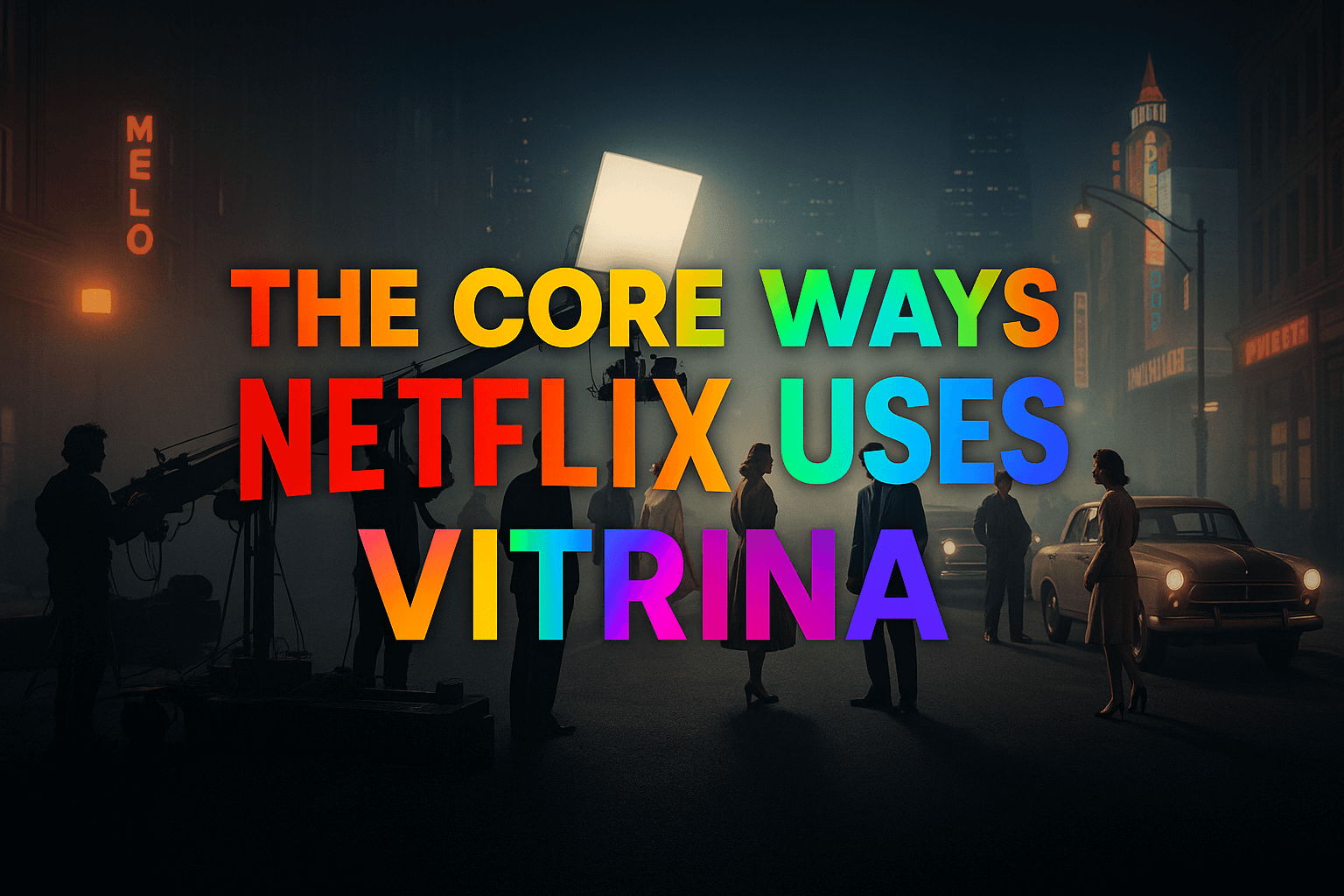Strategic Foresight: The Core Ways Netflix Uses Vitrina for Competitive Intelligence

Introduction
For any global streaming leader, the pace of content competition is relentless. Success is determined not by the current quarter’s slate, but by the strategic foresight achieved months or even years before a competitor’s project is announced.
Competitive Intelligence (CI) in this sector demands moving beyond analyzing subscriber numbers or post-release ratings; it requires deep, actionable visibility into the competitor’s pipeline, human capital, and supply chain partners. This is where the manual aggregation of press clippings fails and specialized intelligence succeeds.
This detailed guide reveals the core Ways Netflix Uses Vitrina for Competitive Intelligence—a model of Strategic Foresight that transforms vague market signals into quantifiable, early-stage competitive advantages for any major studio or streamer.
Table of content
- The Strategic Imperative for Entertainment Competitive Intelligence
- The Visibility Gap in Traditional CI Methods
- Core Ways Netflix Uses Vitrina for Competitive Intelligence
- Strategic Benefits of Pre-Production CI
- Vitrina: The Data Foundation for Streamer Intelligence
- Conclusion
- Frequently Asked Questions
Key Takeaways
| Core Challenge | Executive CI teams lack early, verified visibility into a competitor’s film and TV production pipeline and its associated key talent. |
| Strategic Solution | Utilize a verified Project Tracker and Executive Search tool to transform intelligence from post-announcement to pre-production. |
| Vitrina’s Role | Vitrina tracks over 400,000 global projects and 3M+ executives, providing the M&E Supply Chain data required for true CI. |
The Strategic Imperative for Entertainment Competitive Intelligence
For a global streamer, Competitive Intelligence is a proactive defense mechanism against market disruption. The goal is to anticipate the competition’s next move with enough time to counter-program, secure talent, or adjust a regional budget allocation.
As reported in Variety, the cost of delay in a high-stakes Content Strategy is immense; missing the window to secure a top showrunner or to greenlight a competing genre can result in significant market share loss.
The M&E sector’s CI requirement is fundamentally different from other industries. It focuses less on keyword bidding or product feature comparisons and more on Strategic Foresight related to creative assets.
The critical questions for an executive at a top-tier platform are:
What high-budget project is my rival currently packaging?
Which key creator is moving to a competitor’s exclusive deal?
Where are my rivals prioritizing their production spend internationally?
Traditional CI tools cannot answer these questions because the data resides within the fragmented and opaque M&E Supply Chain—the exact pain points Vitrina was built to address.
The Visibility Gap in Traditional CI Methods
Traditional Competitive Intelligence methods often fall short when applied to the M&E production landscape:
- Public Announcements & Press Releases: These sources only provide intelligence after a critical decision has been made. By the time a project is announced in The Hollywood Reporter, the key creative team is hired, the primary financing is secured, and the opportunity for proactive intervention—such as offering a better deal to a showrunner or fast-tracking a similar project—is lost.
- SEO and Social Listening Tools: These are effective for content marketing CI, but they offer no insight into the actual production pipeline. They track audience sentiment and brand messaging, not the physical movement of projects from script to set.
- Legacy Databases: Many historical databases rely on post-release metadata, failing to track the fluid and dynamic stages of pre-production, which is where the most valuable Strategic Foresight lies.
Vitrina was conceived to bridge this Project Tracking gap by providing verified, real-time data on the supply-chain transactions that precede public announcements. This allows a streamer to move its CI function from being reactive to being truly proactive.
Core Ways Netflix Uses Vitrina for Competitive Intelligence
The effectiveness of Ways Netflix Uses Vitrina for Competitive Intelligence lies in treating the M&E Supply Chain itself as the ultimate source of market intelligence.
1. Tracking Competitor Project Pipelines for Early Market Signals
The most critical use case is Project Tracking for competitive advantage. CI teams can set up real-time alerts on projects associated with key rivals like Disney, Amazon, or Warner Bros. Discovery.
By filtering the Project Tracker to show projects currently in the “Packaging & Financing” or “Pre-Production” stages, the streamer gains Strategic Foresight months ahead of a press announcement.
This data allows for preemptive action, such as adjusting a release calendar to avoid a head-to-head genre conflict or identifying a gap in a rival’s slate that can be exploited for Content Acquisition strategy.
2. Monitoring Executive Movement and Talent Flow
Talent—specifically star showrunners, established directors, and senior Content Strategy VPs—is the lifeblood of a streamer. Vitrina’s Executive Search feature tracks the history of over 3M+ verified executive contacts, including their current and previous company affiliations and their involvement in specific projects.
CI teams utilize this to monitor talent “at risk” of moving to a competitor or to track where top creative executives are landing. The ability to verify a showrunner’s exact role on a rival’s current project (e.g., Executive Producer vs. Consulting Producer) provides granularity that is impossible to get from public press. This Executive Tracking informs talent retention and competitive hiring strategies.
3. Benchmarking Production Spend and Scale via Company Profiling
Understanding a competitor’s financial commitment to content is paramount. Vitrina’s Company Profiling is utilized to analyze a rival’s historical Deal Track Record. CI teams can benchmark competitors by:
- Average Budget Band: Inferring a rival’s investment priority (e.g., $10M-$25M per series vs. $50M+ features).
- Co-Production Frequency: Determining if a rival is shifting to shared risk models in specific territories.
- Genre Portfolio: Quantifying their historical spend in a specific genre (e.g., “Original Scandi Noir”) to find underserved content areas.
This analysis allows a streamer to adjust its own production investment strategy with hard data, mitigating financial risk and ensuring its Content Strategy is differentiated.
4. Identifying Strategic Partner and Vendor Relationships
Streamers must understand how rivals build and manage their M&E Supply Chain. Vitrina allows CI teams to map out a competitor’s entire network of third-party partners and vendors, from VFX houses and localization studios to regional distributors.
For example, identifying that a major competitor is exclusively using a specific animation studio in France or a VFX vendor in New Zealand reveals their intended territorial focus, production capability, and potential cost efficiencies. This depth of intelligence informs where a streamer should invest in vendor relationships to gain similar strategic access or efficiency.
5. Informing Content Strategy with Genre-Specific Trend Data
Beyond individual project monitoring, CI teams use Vitrina’s aggregated data to generate high-level Strategic Foresight reports. By analyzing the velocity of new projects entering the pipeline globally—not just in the US or UK—in specific genres (e.g., the rise of high-end fantasy in Eastern Europe or scripted comedy in Australia), the platform provides validated market signals.
These macro-level insights inform the ultimate Content Strategy and future greenlight decisions, moving from anecdotal evidence of a trend to a data-backed investment hypothesis.
Strategic Benefits of Pre-Production CI
The decision to utilize data-driven Ways Netflix Uses Vitrina for Competitive Intelligence fundamentally alters a streamer’s strategic position from reactionary to anticipatory. By integrating this intelligence into their workflow, CI executives move beyond the fragmented, low-quality data that plagues many competitors.
The certainty provided by verified, real-time Project Tracking and Executive Tracking reduces the risk of strategic surprise, ensuring content investment is maximized for impact. In a market defined by over-saturation, the ability to make a pre-emptive move based on verified supply-chain data is the definitive competitive edge.
Vitrina: The Data Foundation for Streamer Intelligence
Vitrina is the dedicated intelligence platform for strategic decision-making in the global entertainment sector. The platform’s core strength lies in its verified, real-time data, which provides unparalleled visibility into the M&E Supply Chain.
It is the only resource that centrally aggregates a Project Tracker of 400,000+ Film & TV projects and a comprehensive Executive Search database of 3M+ verified executive contacts.
By focusing strictly on industry metadata, collaboration history, and production lifecycle stages, Vitrina delivers the objective, non-hallucinated data required by CI teams to conduct rigorous Company Profiling, benchmark content spend, and execute informed Content Acquisition strategies.
Conclusion: Turning Data into Strategic Foresight
In the high-stakes race for global streaming dominance, timing is everything. The advantage no longer belongs to the platform with the biggest library—it belongs to the one that sees the future first. By transforming fragmented production signals into verified intelligence, Vitrina gives CI teams the ability to detect, decode, and act before the competition does.
For Netflix and other leading streamers, the platform converts speculation into foresight—tracking early-stage projects, mapping executive moves, and revealing emerging partnerships across the global M&E Supply Chain.
This enables leaders to anticipate rather than react, align their content strategy with verified market direction, and make high-value investment decisions backed by real-time data.
Ultimately, Vitrina empowers streamers to replace instinct with insight, and guesswork with predictable, data-backed strategic action. In an industry where every release window counts, that is the true measure of competitive intelligence—and the cornerstone of lasting global leadership.
Frequently Asked Questions
Strategic competitive intelligence in the entertainment industry is the proactive practice of gathering, analyzing, and synthesizing data on rivals’ future plans (e.g., content pipeline, executive hires, and investment focus) to inform a streamer’s long-term Content Strategy and market positioning.
Streamers identify content market gaps by using Competitive Intelligence tools to benchmark their competitors’ historical and current content portfolios, identifying underserved genres, demographics, or international territories where they can secure content for differentiated audience growth.
Tracking pre-production projects is critical because it provides Strategic Foresight that allows a streamer to act preemptively. By identifying a competitor’s project early, a streamer can adjust its own content slate, secure key talent, or negotiate favorable Content Acquisition terms before the project reaches the public market.
The main challenges for real-time competitor project tracking include data volume, latency in data updates, data quality issues (inaccurate or missing information), and the complexity of integrating diverse data sources across the fragmented M&E Supply Chain.

























